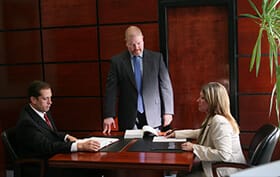Forklift Accidents
The personal injury lawyers at have successfully represented workers injured in forklift accidents, and we specialize in workers’ compensation law and third-party negligence law. We represent injured workers in Worcester, Boston, Fitchburg, Springfield, Southbridge and other towns and cities throughout Massachusetts.
Forklifts and spider forklifts are commonly used in congested construction areas where people work closely around building materials. Combine that with a small, fairly quick and extremely heavy piece of equipment and you have the potential for serious personal injury accidents. In fact, forklift accidents are among the most common construction site and warehouse accidents. Each year, over 20,000 workers are injured in forklift accidents. Of this 20,000, a high percentage suffer serious injuries. Due to the extreme weight of a forklift and the loads they carry, these accidents tend to cause debilitating injuries.
What Caused The Forklift Accident?
Forklift operators are often pushed hard to make deadlines, and this, combined with long hours and fatigue, can play a role in the careless operation of this dangerous piece of equipment. Often, employers are more concerned about getting the job done quickly than getting it done safely. This mindset often causes both the employer and forklift operator to overlook certain safety standards. It is never a good idea to push a dangerous piece of heavy equipment such as a forklift past its safety limits. The accidents and injuries that result are often catastrophic or fatal.
The following are examples of how forklift accidents can occur and cause injury:
- Tipping over — Forklifts have a specified maximum load they can lift. If that limit is exceeded, then the forklift can tip over. As the forklift tips over, it can crush other workers in its path, with either the machine itself or with its overloaded materials. The forklift driver also is at risk for injury during a tip-over, especially if an appropriate rollover protection system was not installed or was in a state of disrepair.
- Driver ejection — In addition to the rollover protection system, forklifts should be equipped with seat belts, armrests and grab handles. All these combine to minimize the risk of operator ejection and serious injury.
- Falling debris — Construction site forklifts, as well as forklifts used in warehouses and anywhere else there is a risk of falling debris from above, should have a falling object protection system. This system protects the operator of the forklift from falling objects such as construction site debris or materials or, if in a warehouse, stock-building supplies.
- Hitting pedestrians — Forklift vs. pedestrian accidents are fairly common since people often work so close to these machines. Sometimes an operator of a forklift may not notice workers in the vicinity, which can result in a collision and injury. Often, in a busy work environment, it’s the worker who does not notice an oncoming forklift, which results in a collision. This type of collision is sometimes caused by a broken or deactivated automatic signal alarm on the forklift or the absence of such a warning device altogether.
- Poor training — Forklift operators must be properly trained and have a license to operate a forklift. Some work sites and warehouses have high worker traffic, while others are congested with workers, building materials and site debris. Regardless, forklifts must be operated with extreme care and caution at all times and under all circumstances. The Occupational Safety and Health Administration (OSHA) has a standard evaluation and training course that all forklift operators must complete before operating a forklift. If an employer does not follow OSHA guidelines, it can be found negligent and liable. The employer has a duty and responsibility to inform untrained and unlicensed employees that forklifts are “off limits.”
- Unsafe driving conditions — For a forklift to be operated safely, driving conditions at the site must also be safe. If there is low light or visibility or narrow or congested pathways, then this constitutes unsafe conditions to drive in. Such conditions on a job site may expose the owner, general contractor, subcontractor or project manager to liability.
- Elevating workers or workers hitching a ride — A forklift is not designed to elevate workers or to give workers rides. A worker may fall from the elevated height or be crushed between the forklift and other objects, especially if the operator drives in an unsafe manner or loses control.
- Poor maintenance — A forklift must be properly maintained and inspected to ensure safe operation. If service or repair is needed, competent personnel must be brought in for such repairs. If an injury occurs due to improper service or maintenance, multiple parties may be found liable, including the repair company.
If you have been injured in a forklift accident and are collecting workers’ compensation, please be aware that a second case may exist under third-party negligence law. These recoveries are often significantly larger than workers’ compensation as a pain and suffering claim is now allowed as compensation.
If you or a loved one has been injured in a forklift accident, contact by email or telephone for your free consultation. Our attorneys have over 120 years of combined experience in personal injury law, construction site law, workers’ compensation law and third-party negligence law. For your convenience, home and hospital visits are available anywhere in Massachusetts.




